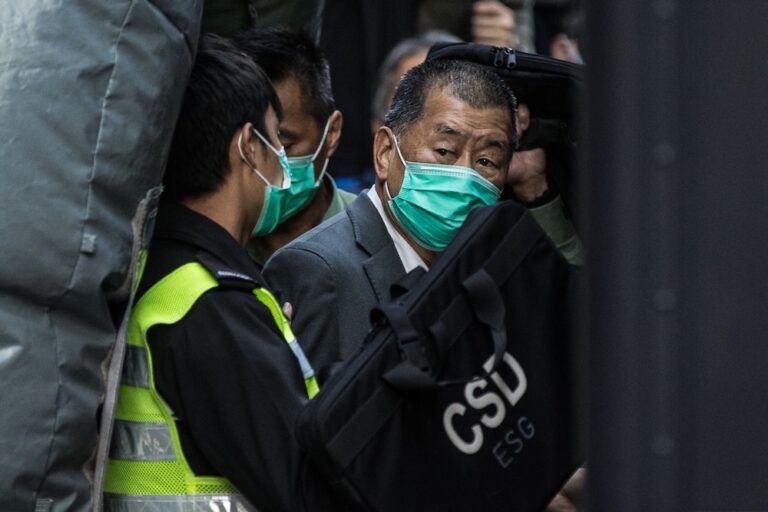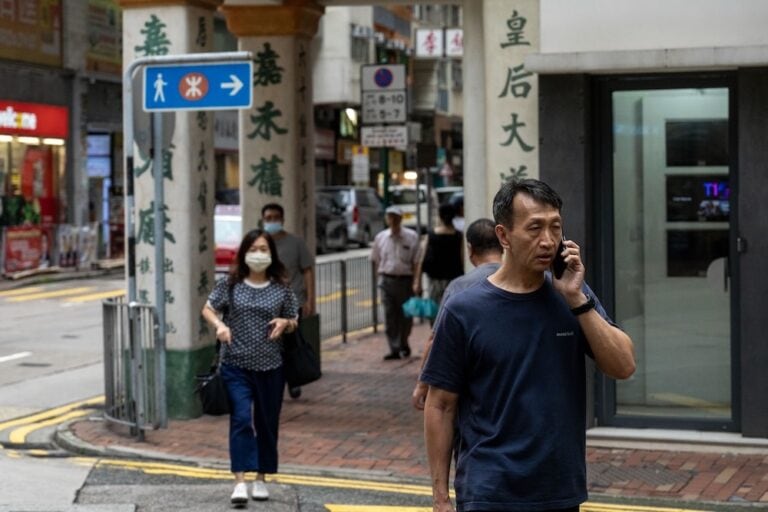(HKJA/ARTICLE 19/IFEX) – The following is a 17 July 2005 HKJA/ARTICLE 19 joint press release: HKJA CALLS ON DONALD TSANG TO ADOPT NEW APPROACH TO MEDIA FREEDOMS In its latest annual report released on July 17th 2005, the Hong Kong Journalists Association issues a 10-point list of demands to the new Chief Executive, Donald Tsang. […]
(HKJA/ARTICLE 19/IFEX) – The following is a 17 July 2005 HKJA/ARTICLE 19 joint press release:
HKJA CALLS ON DONALD TSANG TO ADOPT NEW APPROACH TO MEDIA FREEDOMS
In its latest annual report released on July 17th 2005, the Hong Kong Journalists Association issues a 10-point list of demands to the new Chief Executive, Donald Tsang. One of the top demands is a call for the release of detained Hong Kong journalist Ching Cheong.
The annual report – “A Change of Wind; New Challenges to Freedom of Expression in Hong Kong” – focuses on the new leadership and the potential of Mr Tsang and his team to effect real change to the environment for freedom of expression and media freedoms.
The report notes that Mr Tsang has been giving out mixed signals on the issue – a pledge not to enact national security legislation during his two-year term, while expressing the view that the 2003 legislation was too loose for his liking; a pledge not to rein in Radio Television Hong Kong (RTHK), while implying that the government broadcaster should do more to sell the administration’s policies; and a failure to move quickly to help Ching Cheong.
The HKJA – and its co-publisher ARTICLE 19 – express the hope that Mr Tsang can play a far more active role than his predecessor, Tung Chee-hwa, in upholding and protecting freedom of expression, including media rights. In particular, they call on the new chief executive to take the following action:
1. Strongly encourage the central government to state unequivocally and publicly that it does not – and will not – tolerate actions or words by any mainland official or agency that impinge upon or threaten freedom of expression in Hong Kong.
2. Urge the central government to scrap all regulations that impose restrictions on Hong Kong-based journalists working on the mainland, including those that deny access for journalists working for publications which are considered to be unfriendly.
3. Urge the central government to release detained journalist Ching Cheong forthwith if there are no legitimate grounds under internationally accepted legal norms to detain him, and otherwise to deal with the case in an open and fair manner which is consistent with the rule of law. Ensure that Mr Ching’s civil rights are upheld and allow him to meet with his family, lawyers and Hong Kong government representatives.
4. Refrain from taking any action that may threaten freedom of expression in Hong Kong. This is best achieved by promoting a society that is tolerant of differences of opinion – even if such opinions are not widely held or are anathema to the central government.
5. Refrain from further work on legislation implementing Article 23 of the Basic Law – or at the very least, include sufficient safeguards within the law to ensure that freedom of expression is not harmed in any way by national security legislation. The latter safeguards are best achieved by including in the legislation the Johannesburg Principles on National Security, Freedom of Expression and Access to Information, as well as proper public interest and prior publication provisions in the existing Official Secrets Ordinance. The exercise, if it goes ahead, should be aimed at liberalising existing draconian laws.
6. Ensure that RTHK can continue to enjoy editorial independence through the enactment of legislation guaranteeing the station’s autonomy and editorial independence in clear and unambiguous terms.
7. Implement a policy of maximum transparency, through the enactment of freedom of information legislation, to guarantee access to government information and documents, and the opening up of statutory bodies to public scrutiny. Freedom of information legislation should be based on the principles of maximum disclosure, limited and narrowly drawn exemptions, and an effective appeal mechanism.
8. Implement a non-discriminatory policy towards the media by ensuring that every media organisation is treated on an equal basis – irrespective of what views the media organisation may hold. The government should hold regular news conferences, instead of relying on invitation-only media briefings handed out to selected ‘friends’ of the government.
9. Scrap restrictive media practices, including the use of press passes to enter the Central Government Offices and the designation of reporting areas which are often far from an event of public interest. As a symbolic gesture of openness, the government should tear down the railings set up around the Central Government Offices.
10. Review existing legislation to ensure that it is fully compatible with the right to freedom of expression. This should cover in particular the law dealing with the seizure of journalistic material, to ensure that adequate protection is given to journalistic material held in confidence and to tighten the circumstances in which the law enforcement authorities may seize journalistic material.


